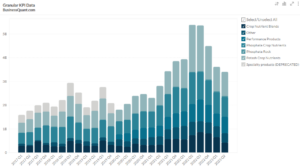
GameStop’s Revenue Breakdown by Product (2019-2023)
Exclusive Data
You need the Pro Plan to access KPI data
- Full access to the platform
- KPI data & segment financials on US stocks
- Financial data on thousands of stocks
- Download data in xlsx and csv formats
Pro Plan
$49 per month*
60% discount ends in:
.
About
More information
Subscribe to Pro or Enterprise plans to unlock this feature.
Contact the Analyst
Subscribe to Pro or Enterprise plans to unlock this feature.
Become a smarter investor today.
Access KPIs & Segment Financials on US stocks
This statistic highlights GameStop’s Revenue Breakdown by Product from 2019 onwards, split between Collectibles, Hardware & accessories, and Software.
GameStop’s Revenue Breakdown by Product
GameStop Corp. generated total revenue of $2.12 billion in Q4 2020. This revenue was earned from the following products:
- Collectibles
- Hardware and accessories
- Software
| Products | Q4 2020 | Q4 2019 | YoY Growth | Revenue share Q4 2021 |
| Collectibles | $228 | $245 | -7% | 11% |
| Hardware and accessories | $1,163 | $965 | 21% | 55% |
| Software | $731 | $1,004 | -27% | 34% |
| Total | $2,122 | $2,214 | -4% | 100% |
(All figures in millions, except percentages)
Collectibles
Under collectibles, GameStop offers licensed merchandise which is related to video games, television industries, movie industries, and pop culture. Revenue from collectibles includes clothing, board games, figures, and other non-game commodities. Customers who play games or watch a show or movie, as true fans, like to collect items that express their fandom.
GameStop has 48 collectibles stores worldwide which serves under the Zing Pop Culture brand and 25 stores in the United States which serves under the ThinkGeek brand. GameStop also offers Game Informer magazine which is the world-famous print as well as digital video game publication.
In Q4 2020, GameStop generated $228.20 million that is 11% of total revenue from this segment. However, the revenue from collectibles witnessed a decline of 7% year-over-year growth from $245 million in Q4 2019.
Hardware and accessories
GameStop offers new as well as pre-owned consoles and hardware. Some of the top seller products are Microsoft Xbox Series X (2020), the Sony PlayStation 5 (2020), and the Nintendo Switch (2017). CLX SET and Nuc 11 Enthusiast are the desktops offered by GameStop.
GameStop also offers video game accessories which are different pieces of hardware that are required to use a console. Video game accessories are everything except the console itself like memory cards, controllers, headsets, skins, power adapters, and other audio/visual cables. GameStop offers accessories of brands like Atrix, Logitech, HYPERX, MSI, Razer, ASUS, Sony, Microsoft, etc.
In Q4 2020, GameStop’s revenue from hardware and accessories contributed 55% of the total revenue amounting to $1.16 billion. In Q4 2020, this is the only segment that witnessed a positive year-over-year growth of 21% from $965 million in Q4 2019.
Software
GameStop offers new as well as pre-owned video game software, digital software, and PC entertainment software that can be used on current and certain prior generation consoles. It also provides digital products which allow the customer to download software or play directly on the internet. GameStop also provides a variety of in-game digital currency, and digital downloadable content (“DLC”).
In Q4 2020, GameStop witnessed adverse year-over-year growth of 27% from $1 billion in Q4 2019 to $ 731.20 million in Q4 2020.
The major reason for the decline in overall revenue earned by GameStop was the material disruption and delay in supply chains caused due to lockdown that impacted the development, manufacture, and distribution of the products. Apart from that, due to lockdown, 90% of GameStop stores were closed which also affected the revenue generated in Q4 2020.
Company Overview
GameStop Corp. is an American-based company established in 1984 by Daniel DeMatteo, Leonard Riggio, and Richard Fontaine. Its headquarters is in Grapevine in Texas. GameStop Corp. completed its initial public offering in 2002 and its common stocks are listed on the New York Stock Exchange under the trading symbol “GME”.
GameStop is a retailer offering video games, electronics, and gaming merchandise. It operates through both e-commerce and over 5000 offline stores. It operates in mainly four geographic segments that include Australia, Europe, Canada, and the United States. Apart from the gaming products GameStop also offers digital products like network points cards, downloadable content, prepaid digital, prepaid subscription cards, and digitally downloadable software. GameStop offers a unique buy-sell-trade program that allows gamers to trade in video game consoles, accessories, consumer electronics, and games for cash or in-store credit. Since 2005, GameStop has been successful in acquisitions of EB Games, Rhino Video Games, Free Record Shop, Micromania, Jolt Online Gaming, Kongregate, Spawn Labs, Impulse, BuyMyTronics, Simply Mac, Spring Mobile, and Geeknet. Some of the major competitors of GameStop Corp. are Auchan, Carrefour, Sony, Microsoft, Best Buy, Amazon, and Nintendo.
Did you like GameStop’s Revenue Breakdown by Product statistic?
Access thousands of more such key performance indicator data points, on listed companies, with Business Quant.
You can also get started for free.
More data on US Stocks

Our Plans
Always know what you’ll pay. No hidden costs or surprises.
- Annual
- Monthly
60% discount until this Sunday
Pro
For serious investing
-
Company KPI data Access segment financials, non-GAAP metrics and KPI data from presentations and filings. Examples include financials by segment / region / product category, AT&T's broadband subscriber trends, Tesla's deliveries by model and lots more.
-
Stock research tools Features include : stock screener, stock comparison, industry financials, stock warnings, advanced charting tools, timeseries tables, scatter charts, financial statements, stock reports, SEC filings, stock ratings, institutional and insider ownership data. There are 200+ financial items and ratios on thousands of US stocks.
-
Industry data & tools Access premium operating data on 40+ industries. Examples include market share, smartphone shipments by vendor, subscribers by wireless carrier, historical gold production. There are 20,000+ such statistics.
Enterprise
For tailored workflows
-
All of Pro plan Get unfettered access to all our dashboards and dossiers.
-
Custom built features Get tailored dashboards built specially for you , based on your set of requirements, to simplify your research workflow.
-
Admin billing Back-end documentation support and multi-seat licensing.
* Billed annually, local taxes extra.
60% discount on Annual plan
Pro
For serious investing
-
Company KPI data Access segment financials, non-GAAP metrics and KPI data from presentations and filings. Examples include financials by segment / region / product category, AT&T's broadband subscriber trends, Tesla's deliveries by model and lots more.
-
Stock research tools Features include : stock screener, stock comparison, industry financials, stock warnings, advanced charting tools, timeseries tables, scatter charts, financial statements, stock reports, SEC filings, stock ratings, institutional and insider ownership data. There are 200+ financial items and ratios on thousands of US stocks.
-
Industry data & tools Access premium operating data on 40+ industries. Examples include market share, smartphone shipments by vendor, subscribers by wireless carrier, historical gold production. There are 20,000+ such statistics.
Enterprise
For tailored workflows
-
All of Pro plan Get unfettered access to all our features.
-
Custom built features Get tailored dashboards built specially for you , based on your set of requirements, to simplify your research workflow.
-
Admin billing Back-end documentation support and multi-seat licensing.
* Local taxes extra.






